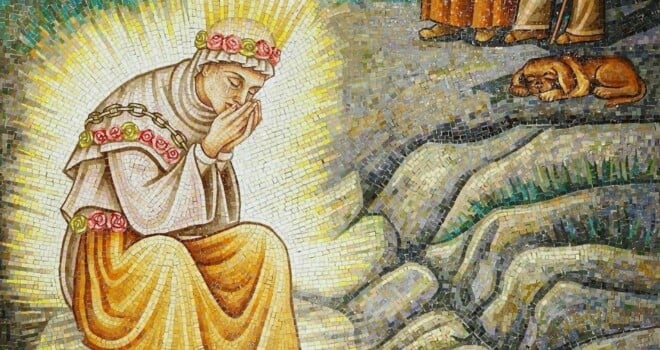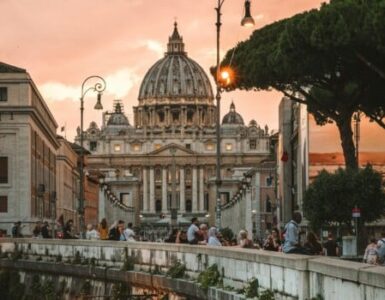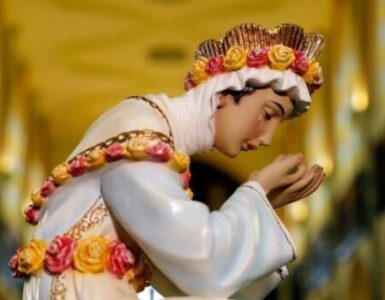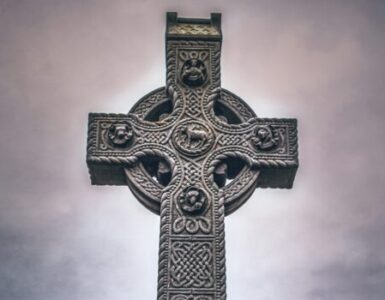The law of the LORD is perfect,
refreshing the soul.
The decree of the LORD is trustworthy,
giving wisdom to the simple.
The precepts of the LORD are right,
rejoicing the heart.
(Psalm 19:8-9)
On September 19, 1846, the Blessed Mother appeared to two shepherd children as they worked and played near La Salette, France. Melanie Calvat and Maximin Geraud were caring for their masters’ cattle and playing in God’s creation. In a blaze of light, Our Lady appeared to them in a state of mourning. Through her tears, she entrusted to them a message of reconciliation to the Lord, urging her children to turn away from sin—especially sin in three particular areas.
One might think that the sins Our Lady was bringing to the children’s attention would be the worst of the worst. However, to modern temperaments, they appear mild.
The main sins were: not honoring the Lord’s Day (Sunday), using God’s name in vain, and not praying. When I first read about this apparition years ago, I was a little shocked! If Blessed Mother was this upset about these sins, what must she think of our world today?
When reading the Ten Commandments, it is important to understand that they are listed in order of importance from greatest to least. The first three commandments have to do with our relationship with God, our most important relationship:
I am the Lord your God: you shall not have strange gods before me.
You shall not take the name of the Lord your God in vain.
Remember to keep holy the Lord’s Day.
The remainder are related to our relationships with our neighbors, and while still commandments, still non-negotiables in the moral life, they do not carry the same weight as the first three.
The late Fr. John A. Hardon, SJ, often said, “Truth is the agreement of the mind with reality.” We were created by God; He knows what is best for us. If we live our lives in accordance with His laws and precepts, then we will experience the blessings of more peace and joy in any life circumstances. To reject God’s laws and live contrary to them is to reject the reality that God knows best for us.
If we reject the law of gravity and walk off the roof of our house, our experience will not be good. If we reject how our bodies work and eat and drink copious amounts of things that aren’t good for us, our experience will not be good. And if we reject the Commandments, individually and as a society, our experience, our culture, will not be good.
Let’s look at the specific laments Our Lady shared at La Salette and what our rejection of God’s laws, of reality, cause in our lives and in society as a whole.
Honoring the Lord’s Day
Regarding keeping Sunday holy, Our Lady said to the children:
Six days I have given you to labor, the seventh I have kept for myself; and they will not give it to me. There are none who go to Mass except a few aged women. The rest work on Sunday all summer; then in the winter, when they know not what to do, they go to Mass only to mock at religion.
At this time in post-revolutionary France, the faith was in tatters. People were more concerned with trade and material needs than with abiding by the laws that God laid out for our protection and for our mental, physical, emotional, financial, and spiritual health. Shops were open and tradesmen just kept working on Sunday as if it were any other day.
In our day and time, Sunday looks very much the same as this. Most people either have to or choose to work in order to pursue a culture of materialism that has become engrained in the current generations. Nothing is more important than money. Not even God. And so, out the window go Commandments #1 and #3.
Divine Providence, You are the support of the poor.
We have lost the trust in God’s order of life which assures us that when we choose to follow His commands, we do not have to be slaves to the clock or to the bank account. We can trust Him to provide what we truly need, including a day off to worship, rest, and restore. We are bound to the system that says we must work more and more, achieve more and more, and acquire more and more in order to be happy.
As with everything that goes contrary to God’s laws, this is a lie. Only within the freedom of trusting our Abba with our lives can we live as He created us to live—peacefully and joyfully—in an abundance that the world does not sell and cannot provide.
The “trickle down” effect of this lack of trust in God and in His laws is the degradation of all parts of human existence and of God’s creation itself. The cycle of more-more-MORE packs our landfills to overflowing, poisons our water and soil, and enslaves workers around the world. The family becomes little more than a convenience-living-pod instead of the life-giving entity that nurtures children who will not choose lies over the gifts of God. And when the convenience-living-pod is no longer convenient? Out it goes for the latest upgrade. The lie leads to death, in many forms, whereas choosing God’s economy of trust leads to life.
We could stem Our Lady’s tears and change the course of history if we were to pray and entrust our lives and wallets to the God who owns everything. He can direct our paths, one small step at a time, away from the culture of enslavement to the commercial world and its ways, to the freedom of being children and heirs of God and His abundance. His abundance often does not look like the lifestyles of the rich and famous. More often, it contradicts them in simplicity and most definitely in the peace it engenders in our souls.
Keeping Sunday holy means accepting and trusting God’s plan for our lives, letting Him be God and knowing that we are not. All else is falsehood. Centuries of living this falsehood has deformed our world in a myriad of ways. While we can only see a few extra dollars in our pockets, a few new gadgets in our homes, and a false sense of control over our futures, Mary sees the deformities, and she weeps.
Not everyone is able to cease working on Sundays immediately or, in certain cases, ever. But even following the top three commandments isn’t about rigidity—it’s about our hearts. God asks us to place every situation in His loving hands and trust Him to lead us to whatever changes are needed to make the shift from a lifestyle following the economy of materialism to one following the economy of God.
Jesus said, “Sabbath was made for man, not man for the sabbath.” God gave us the gift of the Sabbath for our own good. Rejecting it leads us away from our good, from peace, from joy. He will help us to return to keeping Sundays holy because He loves us and wants what is best for us as individuals and for the whole of humanity (including the planet!).
Tomorrow, in Part II we will look at Our Lady of La Salette’s two other laments and conclude our study of the great relevance that this nearly 200-year-old apparition holds for our time.
Photo from the Basilica of the National Shrine of the Immaculate Conception











